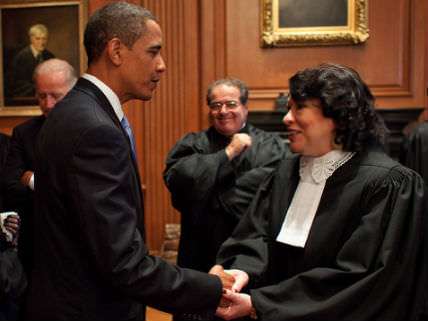Supreme Court Rules for Florida Death Row Inmate in Sixth Amendment Case
SCOTUS releases 8-1 decision in Hurst v. Florida.

Today the U.S. Supreme Court ruled 8-1 in favor a Florida death row inmate who challenged his death sentence on the grounds the state's capital sentencing scheme violated his Sixth Amendment right to trial by an impartial jury. As Justice Sonia Sotomayor explained in her majority opinion in Hurst v. Florida:
A Florida jury convicted Timothy Lee Hurst of murdering his co-worker, Cynthia Harrison. A penalty-phase jury recommended that Hurst's judge impose a death sentence. Notwithstanding this recommendation, Florida law required the judge to hold a separate hearing and determine whether sufficient aggravating circumstances existed to justify imposing the death penalty. The judge so found and sentenced Hurst to death.
We hold this sentencing scheme unconstitutional. The Sixth Amendment requires a jury, not a judge, to find each fact necessary to impose a sentence of death. A jury's mere recommendation is not enough.
The only dissent in the case was filed by Justice Samuel Alito, who complained that the Court was departing from its precedents and rewriting its Sixth Amendment jurisprudence:
As the Court acknowledges, "this Court 'repeatedly has reviewed and upheld Florida's capital sentencing statute over the past quarter of a century.'" And as the Court also concedes, our precedents hold that "'the Sixth Amendment does not require that the specific findings authorizing the imposition of the sentence of death be made by the jury.'" The Court now reverses course, striking down Florida's capital sentencing system, overruling our decisions in Hildwin [v. Florida] and Spaziano [v. Florida], and holding that the Sixth Amendment does require that the specific findings authorizing a sentence of death be made by a jury. I disagree. [Citations omitted.]
The Supreme Court's opinion in Hurst v. Florida is available here.
